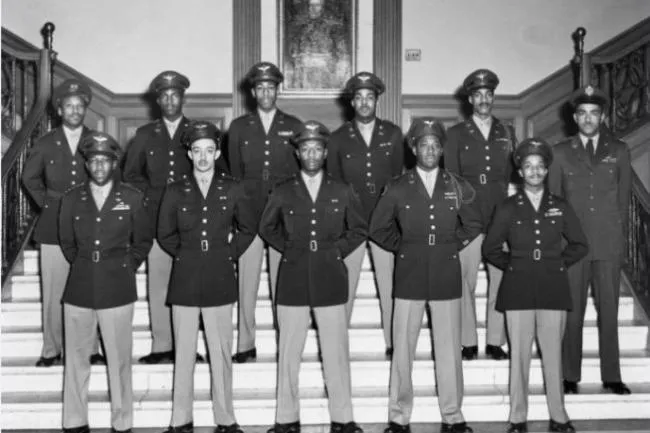When David Fax attended Howard University as an Air Force ROTC cadet in the early 1970s, he had a surprising moment in class. His professor asked what he knew about the Tuskegee Airmen, the renowned group of Black pilots who fought in World War II. Fax, unprepared for the question, admitted he knew nothing. That moment changed the trajectory of his education, largely thanks to the professor who posed the question: retired Air Force Lt. Col. Shelton “Ivan” Ware, a living legend and one of the few remaining Tuskegee Airmen, known as Documented Original Tuskegee Airmen (DOTA).

“We fought two wars,” said Ware, who recently turned 101, in an interview with Military.com. “You had to fight the war of segregation, and you also had to do your duty as far as the enemy was concerned. Keep them from killing you and the rest of your buddies.”
Ware’s military journey began when he joined the Army Enlisted Reserve Corps on April 1, 1942. It was the start of a remarkable 32-year career, during which he would become part of history. Serving as a weapons and vehicle maintenance technician, Ware played a key role in the Red Ball Express, a predominantly Black military unit that ensured Allied forces received the supplies they needed to push forward during World War II.
The Red Ball Express, named for the red markers on its trucks and routes, was vital. It delivered gasoline, ammunition, and food to troops on the front lines. Without the dedication and effort of Ware and his comrades, the outcome of the war could have been drastically different. For over two years, Ware worked tirelessly, ensuring weapons and vehicles functioned smoothly as the Allies fought across Europe.
Interestingly, before his service in the Red Ball Express, Ware had little experience with mechanics. He admitted, “My specialty was small arms. Give me anything from a .22 to a .75 mm Howitzer, and I can do a job on it.” His adaptability and determination exemplified the spirit of the Red Ball Express soldiers, who often had to learn on the job under immense pressure.
During the war, Ware didn’t initially realize the impact Black pilots were having. He heard whispers about the brave airmen but didn’t know they were part of the 332nd Fighter Wing, a segregated unit of Black pilots who would later become known as the Tuskegee Airmen.
The Red Ball Express was predominantly made up of Black soldiers, about 75%, and the unit’s work was indispensable. Over the course of its operation, the Express transported over 412,000 tons of critical supplies, ensuring Allied troops were well-equipped and nourished. Despite facing segregation and racism, these soldiers remained focused on their mission. “Day after day after day, they were barraged by a bunch of garbage… but they said, ‘I’m a professional first. I’m going to do my job,'” remembered Fax, Ware’s former student.
Even amidst the discrimination and challenges, there were moments of light for Ware. He recalled that receiving mail from home was always a special occasion. “It was a religious moment,” he said, describing the emotional impact letters and packages had on him and his fellow soldiers.
Ware’s service earned him two Service Stars and, by the time he left the Army in June 1946, he had risen to the rank of staff sergeant. But his military career didn’t end there. Two years after being discharged, he completed the Air Force ROTC program at Howard University and was commissioned as a second lieutenant. Throughout the remainder of his career, Ware held various roles, from training Air Force cooks and bakers to serving as director of military training in Germany. He also returned to Howard to mentor future generations, including Fax.
Reflecting on the end of WWII, Ware noted, “Everybody was glad the war was over. Even if you weren’t directly affected, you knew that it was affecting a lot of families, both the enemies and ours. People were dying for nothing.”
Ware’s dedication to the military and his legacy as a Tuskegee Airman remains strong. He retired from the Air Force in September 1974 but continues to inspire others. Jerome Hodge, president of the East Coast chapter of Tuskegee Airmen Inc., praised him, saying, “He is healthy. Sometimes he moves better than me.”
Even at 101, Ware remains active and committed to sharing the story of the Tuskegee Airmen, ensuring that future generations understand the importance of their contributions. His advice to today’s military members is simple yet powerful: “That all war is stupid. Avoid it at all costs, and you come out ahead.”
Shelton Ware’s story is a testament to resilience, bravery, and the enduring legacy of the Tuskegee Airmen. He not only survived one of the most challenging times in history but thrived, leaving a lasting impact on the military and the world.



